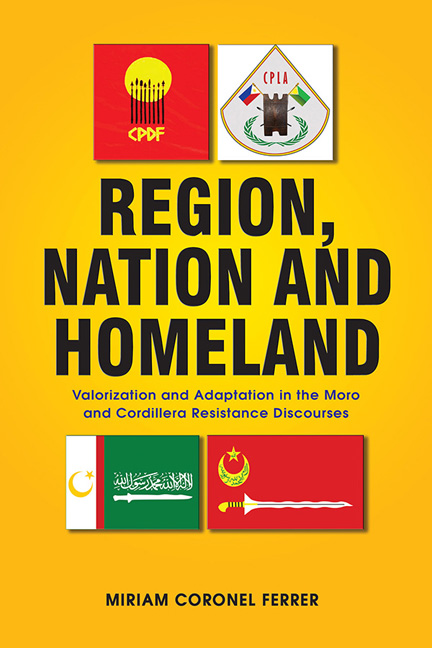 Region, Nation and Homeland
Region, Nation and Homeland Book contents
- Frontmatter
- Contents
- Preface
- List of Abbreviations
- Maps
- 1 Introduction: Text and Resistance
- 2 The Moro Liberation Movement: From Secession to Autonomy
- 3 The Cordillera Movement (1970s–2008): Building and Losing the Consensus
- 4 Nation, Homeland and Ancestral Domain: Intertextuality in the Moro Discourse
- 5 Identity Ambivalence in the Pan-Cordillera Discourse
- 6 Conclusion
- Bibliography
- Index
- About the Author
5 - Identity Ambivalence in the Pan-Cordillera Discourse
Published online by Cambridge University Press: 02 April 2020
- Frontmatter
- Contents
- Preface
- List of Abbreviations
- Maps
- 1 Introduction: Text and Resistance
- 2 The Moro Liberation Movement: From Secession to Autonomy
- 3 The Cordillera Movement (1970s–2008): Building and Losing the Consensus
- 4 Nation, Homeland and Ancestral Domain: Intertextuality in the Moro Discourse
- 5 Identity Ambivalence in the Pan-Cordillera Discourse
- 6 Conclusion
- Bibliography
- Index
- About the Author
Summary
Three different nomenclatures have been used to refer to our unit of interest in this chapter. These are Cordillera, Mountain Province and Igorot. We have already used Cordillera to describe either the resistance movement and the resistance discourses or narratives. The term, moreover, is used to refer to the mountain range, the people inhabiting the territory, and the imagined nation. The term Cordillera region is likewise being used in different ways. It can refer to the state-defined administrative region, the unrealized autonomous region, or merely used as a spatial reference that vaguely encompasses a presumed territorial entity.
The geographic location of the Cordillera discourse is the Gran Cordillera Central mountain range in Northern Luzon. As we shall see, boundaries of this homeland, ancestral domains and/or the roots or origins of what we call today the Cordillera people(s) and Cordillera region have not been fixed but were rather porous. They have been constructed and reconstructed over time, both by state fiat and societal processes.
Then and now, the term Igorot is a highly contested term. Briefly, the term originated during the Spanish times. It was used by the Spaniards and the lowlanders as a collective, undifferentiated identity marker for most of the inhabitants of the Cordillera range. Like the word Moro, Ygorrotes/Igorots (mountain people) came from outsiders, although the American historian and long-time resident of Mountain Province William Henry Scott wrote that it was derived from local languages. Igolot in Tagalog means “dwellers in/people of a mountain chain”. Golod or golor in Tagalog and golot in the language of the Bagos (descendants of Igorots who migrated to Ilocos) meant the mountain or a hill; and the prefix i- denotes place of origin. Prill-Brett offers another possibility — that the name came from the Ilocano word gerret, which means “to cut off”, and may have been inspired by the headhunting tradition among these mountain people. The label, along with its negative and positive attributes, was carried on to the postcolonial period.
Mountain Province originally referred to the politico-administrative unit established by the American colonial regime in 1908. It was made up of seven sub-provinces; namely, Benguet, Ifugao, Bontoc, Apayao, Kalinga, Amburayan and Lepanto. In 1966 this unit gave birth to four provinces, including one that is also called Mountain Province. The other three were Benguet, Ifugao and Kalinga-Apayao.
- Type
- Chapter
- Information
- Region, Nation and HomelandValorization and Adaptation in the Moro and Cordillera Resistance Discourses, pp. 151 - 198Publisher: ISEAS–Yusof Ishak InstitutePrint publication year: 2020


